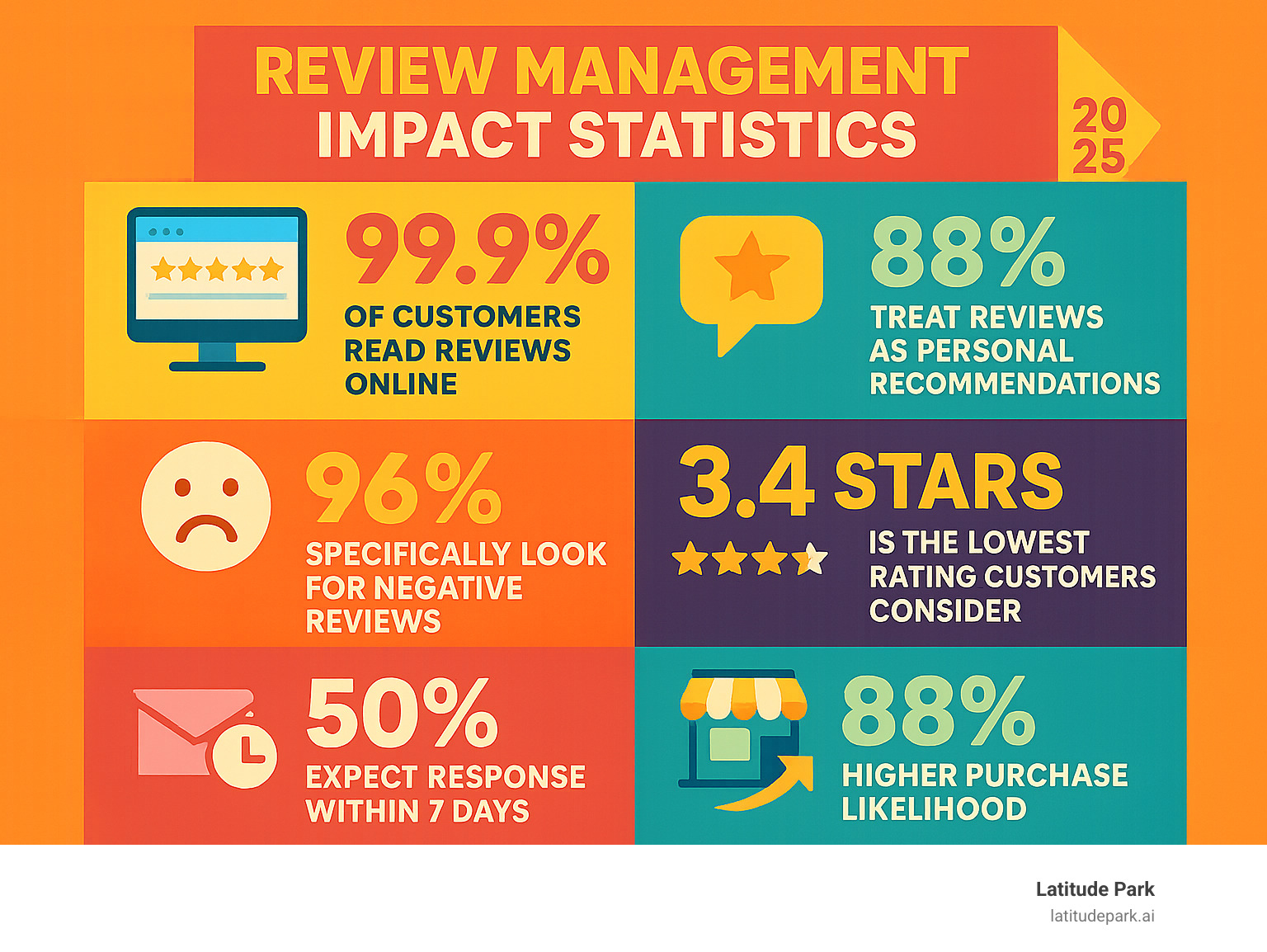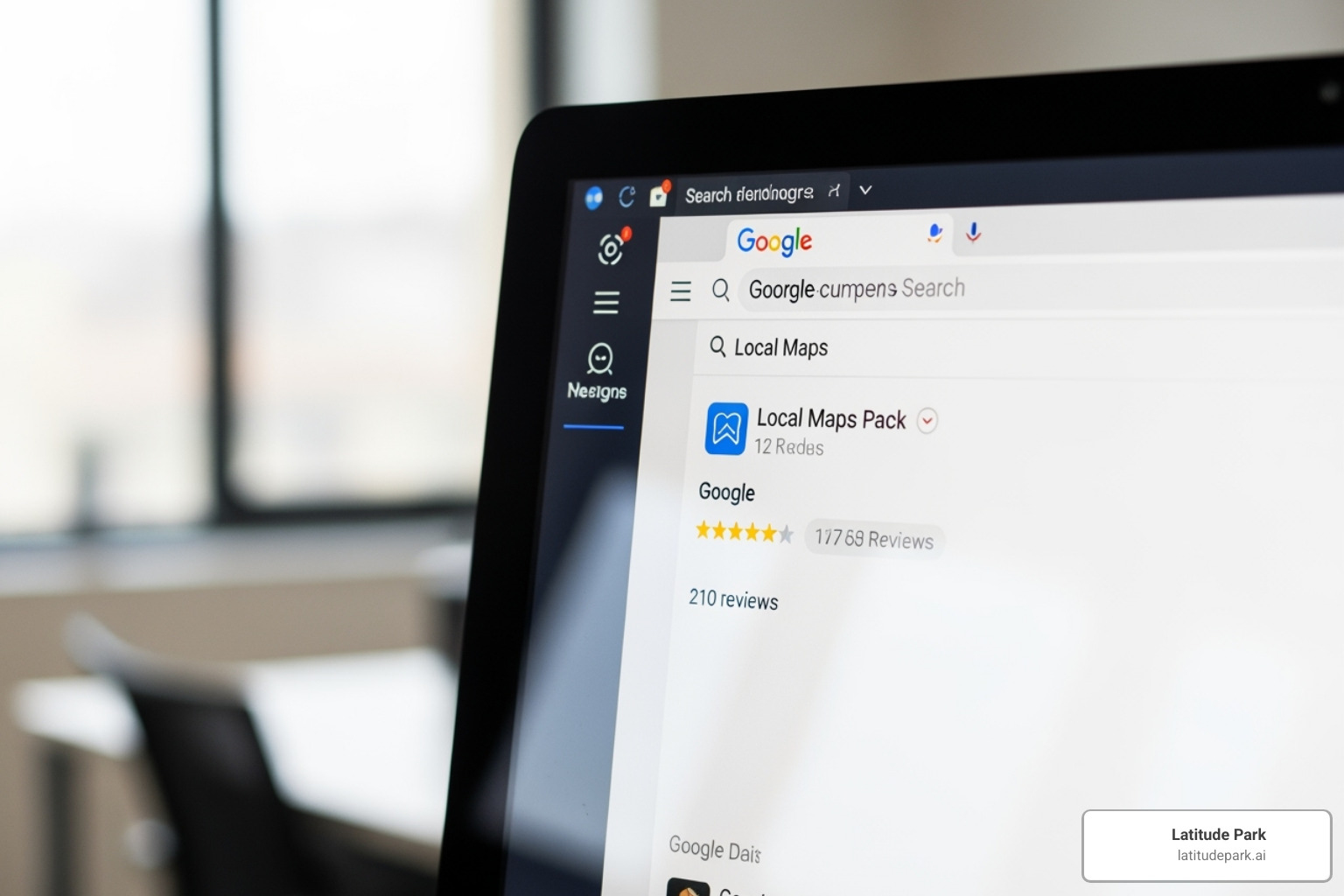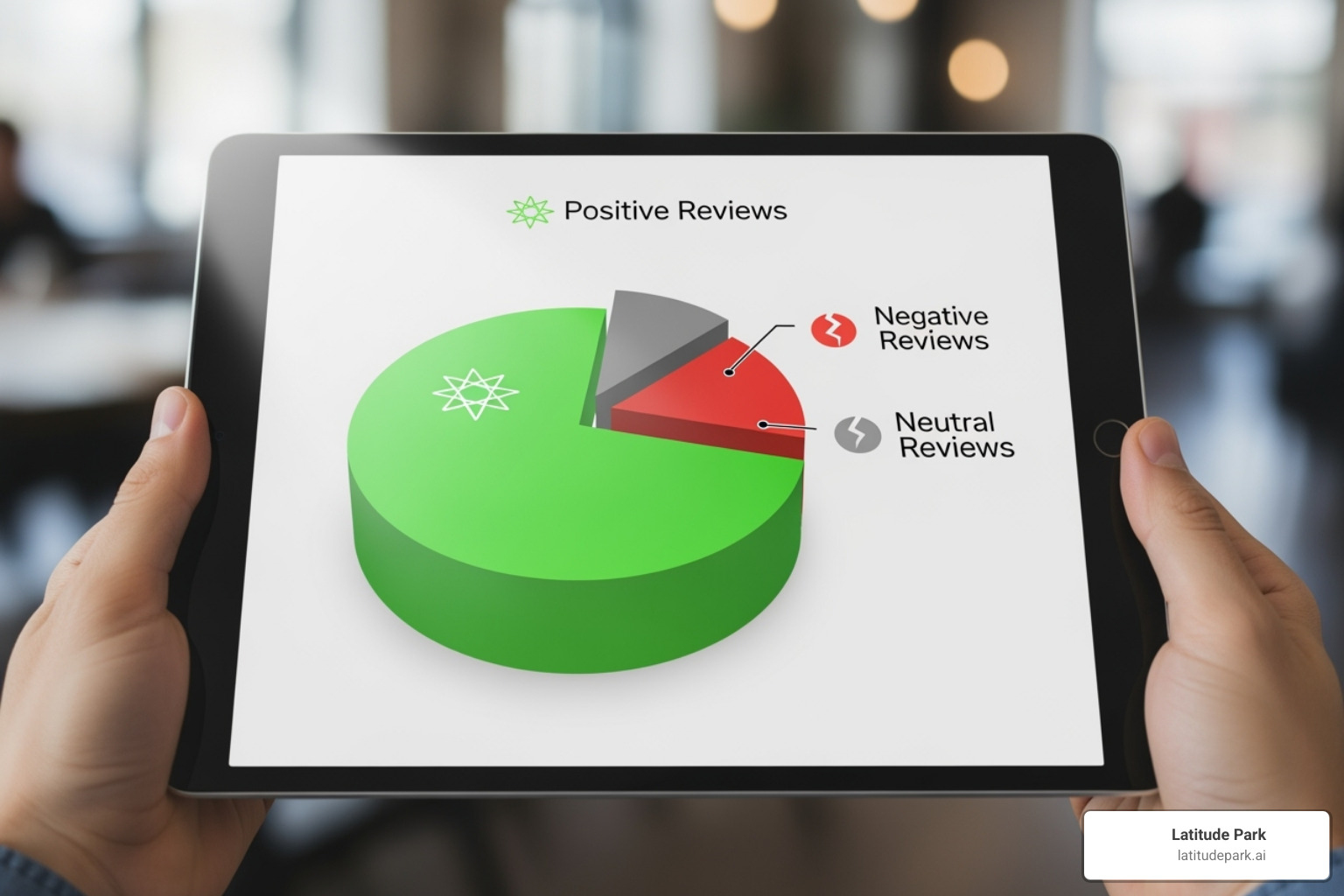Why Review Management is Critical for Modern Businesses
Review management is the process of monitoring, analyzing, and responding to customer reviews across online platforms to build brand reputation and drive growth.
What Review Management Includes:
- Monitoring reviews on Google, Yelp, Facebook, and industry-specific sites
- Responding to both positive and negative feedback
- Generating new reviews through strategic outreach
- Analyzing review data for business insights
- Showcasing positive reviews in marketing materials
The numbers are compelling: Over 99.9% of customers read reviews before making a purchase, and 88% trust them as much as personal recommendations. Strikingly, 96% of customers seek out negative reviews to understand potential downsides, while only 13% will consider a business with a two-star rating or less.
For franchise marketers, review management is even more critical. A single negative review can cost a business up to 30 customers, while positive reviews can influence over 91% of customers to trust a brand. The challenge is maintaining brand consistency across all locations while ensuring each customer feels heard.
Modern consumers expect engagement. More than 50% of customers who write reviews expect a response within 7 days, and 88% are more likely to buy from businesses that respond to all reviews. This creates a responsibility for brands to actively participate in the conversation about their business.
As Rusty Rich, President and founder of Latitude Park, I’ve spent over 15 years helping franchises and small businesses build strong online presences. My experience shows that proactive review strategies are essential for sustainable growth in today’s competitive marketplace.

The “Why”: Core Benefits of a Strong Review Management Strategy

Investing in review management isn’t just about collecting feedback; it’s about building a foundation for sustainable growth. The benefits impact everything from brand perception to your bottom line.
Building trust starts with reputation. Your online reviews are often a potential customer’s first impression. A strong review management strategy boosts your brand reputation by highlighting positive experiences and addressing concerns before they escalate. Each positive review acts as a 24/7 testimonial.
This directly translates into increased customer trust. When people see you actively responding to all feedback, it demonstrates transparency and accountability, turning curious browsers into paying customers. This trust drives sales growth, as businesses with strong review profiles consistently outperform those who ignore feedback.
The benefits extend beyond the first sale. Review management is crucial for improving customer loyalty and customer lifetime value. When customers feel valued, they become repeat customers and brand advocates.
Perhaps the most undervalued benefit is gaining valuable business insights through Voice of the Customer data. Your reviews are a goldmine of information, telling you what customers love, what frustrates them, and what they wish you offered. This data helps you make smarter business decisions and stay ahead of customer needs.
For more insights on why online reviews matter, check out our guide: Are Online Reviews Important? Yes, and Here’s Why.
Review management creates a positive cycle: better reviews lead to more customers, which leads to more reviews and better business insights. It’s an investment that keeps paying dividends.
How Proactive Review Management Boosts Your Online Presence

A potential customer’s first impression is often your star rating in search results. Review management has become a powerful tool for boosting your online presence and getting found by the right customers.
The local SEO impact of reviews is remarkable. Google uses review quantity, quality, and recency as strong ranking signals for local search. A steady stream of positive reviews tells Google that your business is active and relevant right now.
This ties directly into Google’s E-E-A-T signals, which measure Experience, Expertise, Authoritativeness, and Trustworthiness. Every positive review adds to your credibility. When customers share detailed experiences, they vouch for your expertise. When you respond professionally, you demonstrate authority.
Review quantity and velocity are also crucial. A business with 50 recent reviews will often outrank one with 200 old ones because fresh feedback signals a thriving business.
Responding to reviews shows both customers and search engines that you’re engaged. This builds credibility with search engines, which want to recommend businesses that provide excellent customer service. Even a well-handled negative review can increase trust by showing you’re willing to make things right.
For more strategies on building your online reputation, see our guide: Effective Strategies Building & Managing Brand Online Reputation.
The Art of Generating New Customer Reviews
Getting customers to leave reviews should be easy and natural. It’s about timing, convenience, and a gentle nudge.
Timing review requests is key. The sweet spot is 24-48 hours after a purchase or service, when the positive feelings are still fresh.
Automated outreach via post-purchase emails or SMS is highly effective. A warm, personal message thanking the customer and politely asking for feedback feels natural. A simple text with a direct link is quick and mobile-friendly.
The golden rule is to make it easy with direct links. Send customers straight to your Google Business Profile or Yelp page. Every extra click reduces the chance they’ll leave a review. For brick-and-mortar businesses, in-store prompts like a QR code on a receipt can also work well.
Crucially, stay away from fake reviews. Review platforms are sophisticated at detecting inauthentic feedback, and penalties can be severe. Authentic reviews are always more valuable. For more on this, visit Why You Should Always Encourage User Reviews.
Best Practices for Responding to Reviews
How you respond is as important as the review itself. Every response is a public demonstration of your customer service.
For positive reviews, go beyond a simple “thank you.” Personalize your response by referencing something specific they mentioned. This shows you pay attention and value their feedback.
Responding to negative reviews is where you can truly shine. The goal is not to win an argument but to show you’re professional and empathetic.
- Acknowledge and Apologize: Start with genuine empathy for their frustration. A sincere apology goes a long way.
- Be Timely: A quick response shows you’re paying attention and care about making things right.
- Take It Offline: For complex issues, invite them to call or email you directly to find a solution away from the public eye.
- Offer a Solution: When possible, offer a refund, a redo, or a commitment to address the underlying issue.
Always remain professional, even when a review feels unfair. Future customers are watching how you handle conflict. For a complete guide, see How to Manage Online Reviews.
Leveraging Reviews in Your Marketing

Your reviews are marketing gold. Turn testimonials into powerful assets that build trust and drive sales.
- Social Proof on Websites: Displaying star ratings and testimonials on your site instantly builds credibility and encourages conversions.
- User-Generated Content for Social Media: Share snippets of positive reviews or customer photos. This authentic content comes from real people and is highly persuasive.
- Improving Products and Services: Analyze feedback to identify strengths to lean into and weaknesses to fix. This direct feedback loop helps you continuously improve.
- Informing Marketing Copy: The words your customers use are often more compelling than traditional marketing copy. Use their authentic, emotional language in your ads and on your website to resonate with new customers.
To improve your customer listening skills, explore our insights on Mastering Social Listening: Latitude Park.
Choosing the Right Review Management Software
Managing reviews manually across multiple platforms is overwhelming and inefficient. This is where dedicated review management software becomes a game-changer, streamlining the entire process so you can focus on growing your business.
The primary benefits are:
- Centralizing Feedback: All your reviews from Google, Yelp, Facebook, and more are pulled into a single dashboard. No more jumping between sites.
- Automating Processes: Software can automatically send review requests to recent customers, significantly increasing your review volume. AI-powered response suggestions can also speed up your response times.
- Analyzing Trends: Sentiment analysis and detailed reporting help you spot patterns in customer feedback, providing actionable intelligence to make real improvements.
Investing in the right software saves time and resources. It’s an investment that pays for itself in efficiency and effectiveness.
Essential Features in a Review Management Tool
When shopping for software, focus on these must-have capabilities:
- Multi-platform Monitoring: The tool must pull reviews from all the platforms that matter to your business.
- Automated Review Invitations: This is your secret weapon for consistently generating new reviews via email or SMS.
- Centralized Response Dashboard: An intuitive interface to view and respond to all reviews from one place.
- Reporting and Analytics: Provides insights into rating trends, review volume, response rates, and customer sentiment.
- Sentiment Analysis: Uses AI to identify topics and sentiment in reviews, highlighting key issues or strengths.
- Team Collaboration Tools: Allows you to assign reviews, track progress, and maintain a consistent brand voice, which is essential for multi-location businesses.
- Mobile Accessibility: A mobile app or responsive interface lets you manage reviews on the go.
How to Select a Solution for Your Business
Choosing the right software is about finding the best fit for your specific needs.
First, assess your business needs. Are you a single location or a multi-location franchise? What is your review volume? This will help you avoid paying for features you don’t need.
Next, consider budget and ROI. Look beyond the subscription cost to the value of time saved and potential business growth. A good tool should pay for itself.
Ease of use is critical. If a tool is confusing, your team won’t use it. Always take advantage of free trials and demos to test the interface and workflow.
Don’t overlook customer support. Reliable support can save hours of frustration.
Finally, think about scalability for growth. Choose a solution that can grow with your business, handling more locations, users, and reviews without forcing you to switch platforms later. For more insights, explore Small Business Online Reputation Management.
Frequently Asked Questions about Review Management
Let’s tackle some of the most common questions about review management.
What is the difference between review management and reputation management?
Think of review management as a focused component of the much broader reputation management.
- Review management deals specifically with monitoring, responding to, and generating customer reviews on platforms like Google and Yelp.
- Reputation management is the whole picture. It includes review management but also covers social media mentions, news articles, forum discussions, and proactive public relations. It’s about managing the entire online narrative around your brand.
While review management is a part of reputation management, the reverse isn’t true. For businesses looking at the complete picture, check out our LP Services: Reputation Management.
How quickly should we respond to a customer review?
Timeliness is critical. More than 50% of customers expect a response within 7 days, and 1 in 4 expect one within 3 days.
A slow response suggests you don’t care about their feedback. Our recommended best practice is to respond within 24-48 hours. For negative reviews, a quick, thoughtful response is even more crucial and can often turn an angry customer into a loyal one. A prompt “thank you” to a positive review reinforces the good experience and encourages repeat business.
Can I delete a negative review about my business?
The short answer is generally, no. Platforms like Google and Yelp have strict policies against businesses removing reviews they don’t like. This is to maintain trust in the review system.
Review removal is only possible if a review violates the platform’s terms of service—for example, if it’s spam, contains hate speech, or is posted by a competitor. In these cases, you can flag the review for the platform to investigate, but the decision to remove it is theirs alone.
The best strategy is to respond professionally and work to outweigh negative reviews with a steady stream of positive ones. A well-handled negative review can actually boost your credibility by demonstrating transparency and a commitment to customer service. The goal isn’t a perfect record, but an authentic and responsive one.
Conclusion
Review management is no longer optional—it’s a fundamental pillar of modern business success. A strategic approach boosts brand reputation, builds customer trust, drives sales, and provides invaluable insights directly from your customers.
By actively generating, monitoring, and responding to reviews, you improve your local SEO and build credibility with search engines like Google. Leveraging these authentic customer voices in your marketing creates powerful social proof that resonates far more than traditional advertising. While the right software can streamline this process, success requires a consistent, ongoing commitment to listening and engaging.
This isn’t a one-time task; it’s a continuous cycle of listening, engaging, and improving that builds a truly customer-centric brand and fosters deep loyalty.
At Latitude Park, we specialize in crafting custom review management strategies for franchises and multi-location businesses. We understand the complexities of maintaining a consistent brand voice while addressing local market dynamics. We help you take control of your online conversation and turn customer feedback into your greatest competitive advantage.
The conversation is happening whether you’re participating or not. It’s time to be a part of it.
Learn how our review management services can help your business grow.









